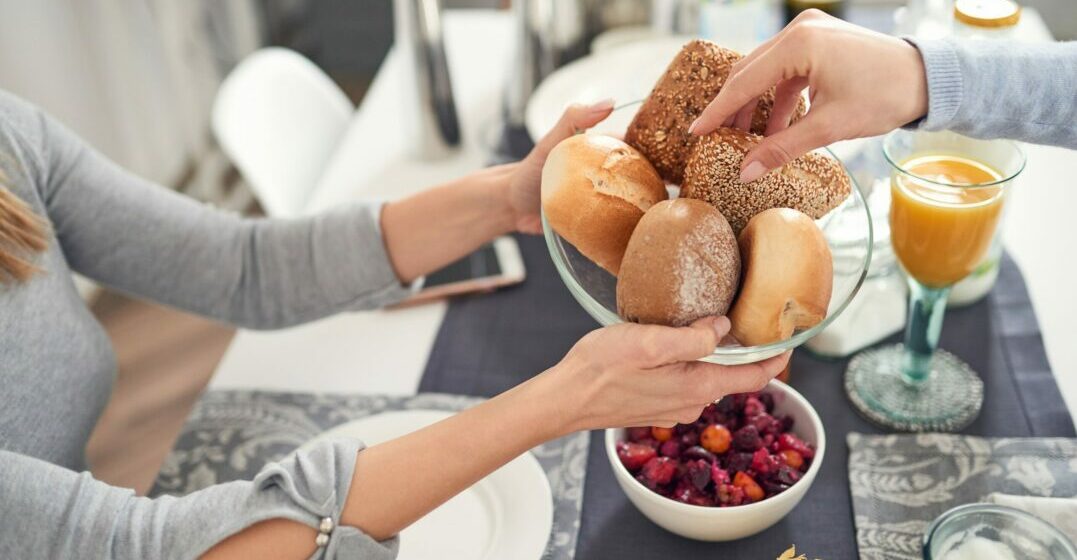Updated on January 5, 2024

German breakfast: 8 ideas for a good start to the day

What comes to mind when you hear German breakfast? Bread rolls, probably. Or bread in general. If that sounds boring, take a closer look at German breakfast tables. Indeed, you won’t discover fancy dishes or a plethora of choices in most cases. But there is enough variety to suit every taste. What’s more, most of the staple foods Germans have for breakfast will provide you with enough healthy energy to make it until lunch. If you choose wisely, of course. For those of you with a sweet tooth, there are maybe even too many options to get your sugar rush. If nothing else, they all taste delicious. Hungry? Here are the top eight German breakfast choices.
Breakfast is said to be the most important meal of the day. While some people go all in and sit down for a proper meal, others skip breakfast altogether and rather sleep a little longer. Classic German breakfast suits both groups. There are many choices to put together a quick and easy meal and enough varieties to turn breakfast into brunch.
Dating back to at least Ancient Egypt, bread rolls have conquered the world. Some Germans love their bread rolls so much that they head to the bakery every day to get freshly baked Brötchen. Some bakeries even deliver right to your doorstep. Weiße Brötchen, white rolls, are crispy on the outside and soft inside. Mixed rye, wholemeal and seed-based bread rolls have different tastes and are rich in fibers, vitamins and minerals.
Believe it or not, you can choose from more than 3,000 varieties of German bread. Flour, seeds and technique of preparation make the difference. Sourdough bread (Sauerteigbrot) and Pumpernickel, a dark and heavy bread made with 100% rye, or Mehrkornbrot using several kinds of grains, are only a few examples. There are also countless sweet and hearty pastries and special varieties for the holidays such as Stuten for Christmas.
Toast is as simple as it sounds. The toasted bread comes in varieties reflecting the many styles of bread. White bread, wholewheat toast and toast with seeds are popular varieties.
If you like a hearty breakfast, cold meat and cheese will be your friends. Many Germans will spread butter on their bread roll and then add a slice of ham, salami or cheese, maybe even a slice of tomato or gherkins. Try Schwarzwälder Schinken, the famous cured and smoked ham from the Black Forest. Kochschinken is cured (gepökelt), boiled (hence the name) and sometimes smoked.
Nutella or any other kind of chocolate or nougat spread is not only popular with kids. Many Germans will also have strawberry, cherry or blackberry jam in their fridges. Visit a farmer’s market to stock up on homemade jams and local, high-quality honey.
Most Germans will have a soft-boiled or hard-boiled egg for breakfast. Omelets, scrambled and fried eggs are more popular on the weekends and always part of the breakfast menu when you eat out. At a typical German breakfast, fried eggs are served sunny side up.
Müsli, rolled oats with grains, seeds, nuts and dried or fresh fruit, is served with milk as a healthy start to the day. Granola and corn flakes are less healthy but sweet alternatives.
Mettbrötchen is enjoyed in the northern parts of the country but is available everywhere. Mett, minced raw pork, seasoned with salt and pepper and topped with chopped onion, is served on half of a bread roll. The Bavarian Weisswurst is all about tradition. The sausages are made of minced veal and pork back bacon flavored with parsley, onions and lemon. They date back way before the invention of the refrigerator, which is why they traditionally are prepared in the morning and eaten before 12 o’clock. When served, don’t wait too long either. Weisswürste are not boiled, only heated for less than ten minutes, so they won’t keep fresh forever. You eat Weisswürste by sucking the meat out of the skin (zuzeln). In any other context, this would be bad manners! Served in the bowl of water used for preparation with sweet mustard, a soft Brezn (Pretzel), they go well with a glass of Weissbier (white or wheat beer). Yes, some Germans drink beer for breakfast! Usually, it will be coffee, tea or milk and orange juice, though.
The typical German breakfast is usually a short and sometimes sweet affair. Bread and bread rolls with cold meat and cheese or sweet spreads make a quick and easy but filling meal to start your day. No need to rush it, though. You can enjoy a German breakfast for many hours and practice your German skills, too.